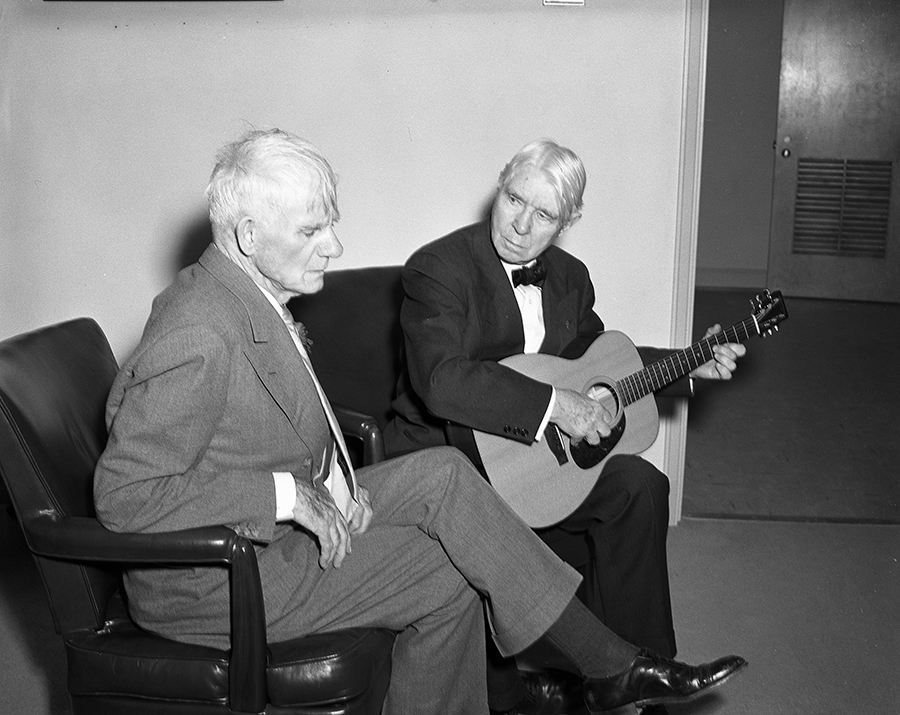
“Armstrong’s Stars” is a collaboration between the Armstrong Browning Library and Baylor’s Texas Collection. Once a month we feature a story about a celebrity that Dr. A.J. Armstrong brought to Baylor. These stories highlight an interesting part of Baylor’s history and include collection materials housed in both the Armstrong Browning Library and the Texas Collection.
This month’s story was contributed by PhD candidate Jeremy Land.

In 1920 Baylor University celebrated its Diamond Jubilee with help from the English department’s Dr. A.J. Armstrong. The university used the occasion to invite some of the most important names in American letters to speak at Baylor. A year later Baylor was developing a reputation as a place where not only poets were welcomed, but a place where they could find a receptive student body.
One of the first and most important writers to travel to Baylor was the noted poet, journalist, historian, and folk musician Carl Sandburg. By the time Dr. Armstrong persuaded Sandburg to visit and read his work at Baylor in the spring of 1921, the poet had already won the first of his eventual three Pulitzer prizes—Sandburg won the Pulitzer Prize for his books Cornhuskers (1918), Abraham Lincoln: The War Years (1939), and Complete Poems (1951). In the early 1920s Sandburg was building a reputation as a first rate poet of the American people. His early poetry drew inspiration from his time as a hobo traveling across the west, his years working as a journalist in Chicago, and the lives of ordinary Americans. His first major volume Chicago Poems established him as an innovative and powerful new voice in American poetry. It was this reputation that prompted Baylor’s student newspaper The Daily Lariat to describe Sandburg as a “man’s poet” as early as 1925, and perhaps attracted so many young Baylor Bears to Sandburg’s readings (“Carl Sandburg, Noted Poet, Coming Here for Reading on April 3” 1).

The poet apparently enjoyed his time at Baylor and made great efforts to ingratiate himself to the students while he was here. He even went so far as to visit a sick Baylor undergraduate in the hospital and give him a private recitation of his work when he discovered that the young fan could not make his reading. Ultimately, Sandburg was so impressed with the Baylor students he met that he cited them to his fellow poet and friend Robert Frost as a reason to journey to Texas (Douglas 129-135).

Over the next thirty years, Sandburg would make an additional three visits to Baylor. Each time his stays were heralded as the coming of a great poet, and each time he offered his audience something new and innovative. By his third visit in 1932 Sandburg’s critically successful collection of American folk music, American Songbag (1927), was fully integrated into his performance and, in addition to reading poetry, he would sing from his collection to Baylor students during chapel (“Carl Sandburg Will Speak Here Friday” 1).
By his fourth visit in 1952, Sandburg had achieved an elder statesman status among American writers. During his final trip to Baylor, Sandburg used his last time before the student body to discuss the value of going into the world and experiencing life firsthand as opposed to vicariously living through pop culture, going so far as to critique one student who claimed to have sat through over 200 episodes of “The Jack Benny Show” (“Poet Slams TV, Movies, Radio” 1). As anarchistic as Sandburg’s criticism sounds to modern readers, his intent illustrates Dr. Armstrong’s ultimate goal in bringing writers like Sandburg to Baylor. Dr. Armstrong’s programs routinely brought Baylor’s students great writers from across the world. His intent was always to “give students an opportunity to come into contact with world forces and world geniuses” (Douglas 173). Sandburg’s time at Baylor surely exposed the students who came to see him to one of the greater geniuses and challenged them to see their lives in a new light.
Works Cited
“Carl Sandburg, Noted Poet, Coming Here for Reading on April 3.” The Daily Lariat 23 March 1925: 1. Web. 1 Dec. 2014
“Carl Sandburg Will Speak Here Friday.” The Daily Lariat 2 February 1932: 1. Web. 1 Dec. 2014
Douglas, Lois Smith. Through Heaven’s Back Door: A Biography of A. Joseph Armstrong. Waco, TX: Baylor UP, 1951. Print.
“Poet Slams TV, Movies, Radio.” The Daily Lariat 12 March 1952: 1. Web. 1 Dec. 2014
No Comments